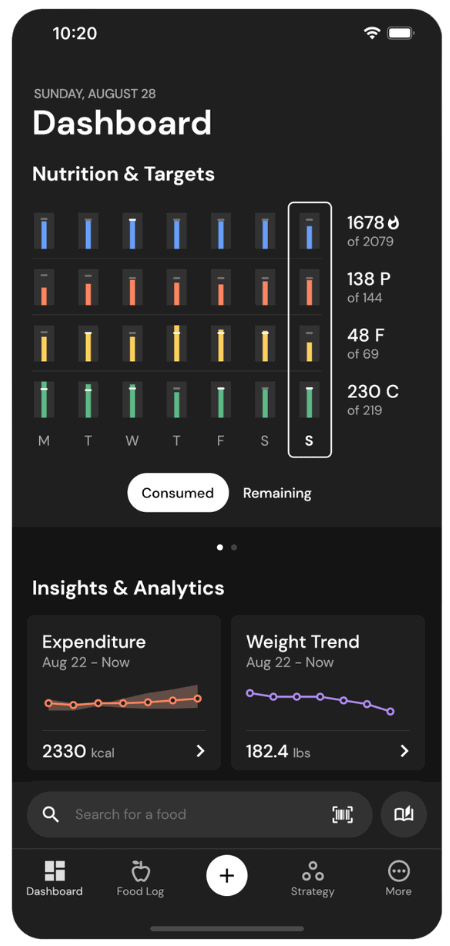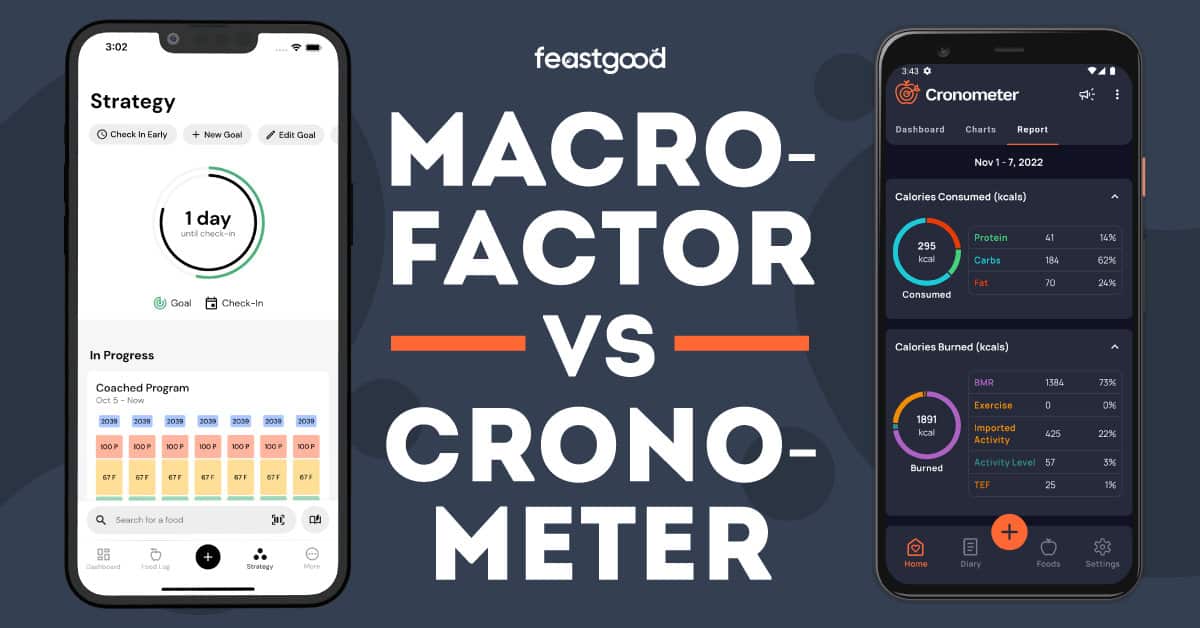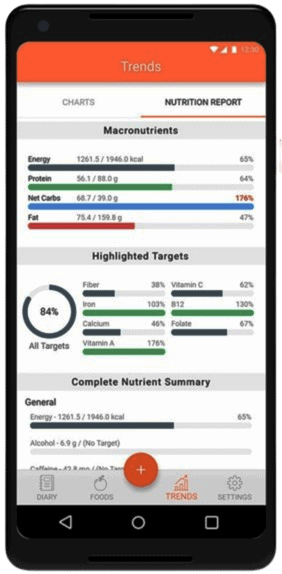Having used both Macrofactor and Cronometer for over a year (and with clients), I can confidently say the benefits and drawbacks of each nutrition app and help you decide which is better based on specific needs.
Key Takeaways
- MacroFactor is a built-in diet coach that gathers users’ data to update calorie and macro targets as they progress. Cronometer is an app with extensive tracking and data capabilities, but it provides no recommendations based on this information, as changes must be made manually.
- MacroFactor is a better app for those new to tracking, strength athletes, and those with body composition goals. The app prioritizes calorie and macronutrient tracking, teaches users about optimal protein intake and weight loss rates, and serves as a built-in diet coach to keep people on track to reach their goals.
- Cronometer is geared toward individuals working with health professionals or those with specific health or diet needs (i.e., low sodium diets). The app allows users to keep track of more advanced metrics like their lab results and important biomarkers (like blood pressure) in addition to calorie, macronutrient, and micronutrient intakes.

Overall Rating: 4.8/5
MacroFactor

Overview
Features
Best For
*Enter code FEASTGOOD when signing up to get an extra week on your free trial (2 weeks total).

Overall Rating: 4.4/5
*This link gets you 10% off the gold plan. No code is required.
Medical Disclaimer: The content of this article is provided for educational insights only. It should not be used as medical guidance. Individuals with a past of disordered eating should refrain from weight loss programs or calorie tracking. For medical advice, consult a certified healthcare professional. If you’re struggling with eating disorders, contact NEDA for assistance.

What is MacroFactor?
MacroFactor is a nutrition app that allows users to track their calorie and macronutrient intakes, monitor weight trends, log progress pictures and body composition changes, and serves as a built-in diet coach.
During the setup process, the app asks the user about their age, gender, activity level, and other metrics to determine their calorie needs based on the user’s goal (weight gain, maintenance, or weight loss).
With each passing week, the app learns more about the user’s calorie expenditure and how much the user needs to consume to reach their goal.
Based on the foods that users are logging and changes in weight over time, the app fine-tunes its recommendations to keep users on track with their goals.
Unlike other apps, MacroFactor is extremely dynamic because its founders, Greg Nuckols and Eric Trexler (renowned fitness experts and researchers), understand that our metabolic rate is highly adaptive and responsive to weight loss and gain.
One of the best things about MacroFactor is that it doesn’t require you to be as rigid with your macro targets to see progress. The app has been designed to allow for more flexibility so that you aren’t punished for not hitting your targets perfectly every day.
Want to learn more? Read my in-depth experience testing Macrofactor here.
Pros
- Ability to customize calorie & macro distribution throughout the week
- Large food database with in-depth nutritional information
- Three program options (coached, collaborative, manual)
- Four food logging options (including AI description)
- Dynamic and intuitive nutritional recommendations
- Progress tracking capabilities (measurements & photos)
Cons
- No free version is available
- No desktop version of the app
MacroFactor App
It has a large verified food database, it’s the most customizable nutrition tracker on the market, it constantly adapts to your metabolism, it’s easy to use, and it’s upgraded regularly as new scientific evidence or suggestions are presented.
Enter code FEASTGOOD when signing up to get an extra week on your free trial (2 weeks total).
What is Cronometer?
Cronometer is a comprehensive health and fitness app that allows users to track more than just their calories and macros. Folks can use the app to monitor their vitamins and minerals, lab test results, and various biomarkers.
Cronometer has an extensive and verified food database, allowing users to log their food intake accurately without double-checking the nutritional information online. Users can also add recipes and custom foods for ease of use.
Cronometer allows you to set your own calorie and macro targets or you can allow the app to estimate them for you based on the information you provide while setting up the app.
You can also track up to 82 different micronutrients (vitamins & minerals) to ensure you’re getting the recommended daily dose.
However, one drawback is that Cronometer doesn’t update your targets for you after the initial setup, so you will have to edit them yourself or hire a health professional to update them for you to continue progressing over time.
Cronometer is ideal for those working with health professionals because you can easily share your profile with your nutrition coach, dietitian, or doctor so that they can access your data and make changes to your inputs as necessary.
The app has more extensive health-tracking features than any other app I’ve seen, allowing users to monitor changes in blood pressure, sleep quality, subjective mood, body fat percentage, water intake, and bowel movements.
Despite its vast functionality, the app is simple to use, and the setup process isn’t overly long.
Want to learn more? Read my in-depth experience testing Cronometer here.
Pros
- The food database is large and only contains verified foods
- Users can customize their calorie, macronutrient, and micronutrient targets
- It has extensive micronutrient-tracking capabilities
- Users can track health-related metrics like blood pressure and other biomarkers
- You can share your profile with a health professional and allow them to make changes
- The community is active, and support is available in several formats
Cons
- Calorie and macro targets are not automatically adjusted
- Calorie counts don’t automatically appear when searching for a food
- The free version doesn’t allow for food grouping into individual meals
MacroFactor vs. Cronometer: Head To Head Comparison
To help you identify which app is best for you, I’ve compared them across 10 key criteria.
1. Food Database
MacroFactor
MacroFactor’s food database is large and mostly verified. Each entry comes with an in-depth breakdown, including information on fibrous carb content, amino acid distribution, and micronutrients for those who want more detailed information on the food they are logging.
MacroFactor also prides itself on having the fastest food logger on the market!
Cronometer
Cronometer’s food database is verified and based on data from the USDA’s Nutrition Coordinating Center Food & Nutrient Database (NCCDB).
Users who want to submit entries must include a photo of the nutritional label and each entry is reviewed by Cronometer staff before approval to ensure accuracy.
The Winner: Cronometer
The two apps are close in this category, but Cronometer takes the win because each entry is verified to be accurate and users can contribute to the food database. I also appreciate that each user-created entry must follow strict rules and be approved before becoming publicly available.2. Tracking Capabilities
MacroFactor
MacroFactor allows users to track their calories, macronutrients, micronutrients, physical activity, body weight, body fat percentage, weight trends, progress photos, body measurements, and water intake.
Cronometer
Cronometer tracks calories, macronutrients, and up to 82 micronutrients. It also allows users to track health-related biomarkers (from lab results), sleep, mood, heart rate, body weight, body fat percentage, body measurements, bowel movements, and physical activity.
The Winner: Tie
MacroFactor and Cronometer are both fantastic in this category, and there isn’t a clear winner.Perhaps the main difference is that Cronometer is more beneficial for health-conscious people and those looking to track more advanced metrics (e.g., athletes).
However, MacroFactor allows users to track all the important fitness metrics and goes a step further by providing insights based on the data provided with its weight trends and calorie expenditure estimations.
3. Calorie Recommendations
MacroFactor
MacroFactor asks users about their age, gender, height, weight, activity level, fitness experience level, and other preferences to estimate their nutritional needs.
It then gathers user data to understand their needs better and update its recommendations over time.
Users can also opt for MacroFactor’s manual program style (more on that below) and override the app’s recommendations.
Cronometer
Cronometer asks users about their age, gender, height, weight, and activity level and provides some initial nutritional recommendations for users to follow, but they can override these recommendations if desired.
Cronometer does not update these recommendations over time, so the user will have to make adjustments themselves if they aren’t progressing toward their goal.
The Winner: MacroFactor
MacroFactor is the clear winner in this category because it goes above and beyond for the user.Its initial recommendations are more accurate on average, and the app continually updates the user’s targets based on new data, such as weight trends, body fat percentage, etc.
4. Level of Customization
MacroFactor
MacroFactor is an incredibly customizable macro-tracking app that allows users to modify their weight loss rate, preferred protein intake, weekly calorie distribution, calorie and macro targets, and its coaching styles.
Another unique but extremely important customization available to users is the ability to set and adjust their calorie floor. The calorie floor represents the minimum number of calories that a user is willing to eat in pursuit of their goal.
This exists as a safety feature so that users are aware that going below a certain calorie intake can have some metabolic and muscular consequences.
If you’re pursuing general fat loss, then you select a “standard calorie floor” to ensure you’re not sacrificing hard-earned muscle; but if you’re using MacroFactor to prepare for a bodybuilding competition, then you can set your calorie floor lower to help you get stage lean.
Cronometer
Cronometer also allows its users to tweak calorie, macronutrient, and micronutrient values and provides users with the ability to change their calorie distribution throughout the week (high/low-calorie days).
Users can also customize their dashboard and food diary to focus on specific nutrients for those who are monitoring their intake of specific micronutrients (i.e. sodium).
The Winner: Tie
Both apps allow for a higher level of customization, so it’s difficult to say that one is better than the other.Cronometer excels in its ability to customize micronutrient targets and displays, whereas MacroFactor excels in its ability to set calorie floors and its coaching styles (discussed below).
5. Educational Opportunities
MacroFactor
MacroFactor is not an educational app, but it teaches users a lot about the nutritional value of foods, how their choices affect their daily calorie intake, how calorie and macronutrient targets change as a result of weight loss and gain, optimal weight loss rate, calorie cycling, and more.
Users can learn more about their bodies over time based on the weight trends and calorie expenditure estimates that MacroFactor provides.
Cronometer
Cronometer teaches users about nutritional intake and what foods are the best sources of particular nutrients.
Its reports show you if you’re not getting enough of specific vitamins or minerals, and the ‘Ask the Oracle’ feature tells you what foods are the best sources for given nutrients.
The Winner: MacroFactor
While both apps are excellent in this category, MacroFactor is slightly better because it teaches users more about how their body responds to changes in food intake and how many calories their body is expending. The app also does a great job of providing information on each of its metrics so that users know why each metric is important.It also teaches users that they don’t have to be “perfect” to see progress because users aren’t punished for going over their targets.
Cronometer is also great, but its main form of education is simply providing recommended ranges for micronutrient targets which show users where they may need improvement to avoid nutrient deficiencies.
6. Coaching
MacroFactor
MacroFactor has different levels of coaching depending on the program style that you choose when signing up.
The program styles are:
- Coached: the app does everything for the user, including macro and calorie updates as needed based on how they are progressing toward their selected goal.
- Collaborative: similar to the coached version, except the user can make adjustments as desired to customize their targets based on their preferences.
- Manual: the user must make all changes to their calorie and macro targets manually as they see fit. Some users will also choose this program if they’re working with a nutrition coach.
These different program styles allow you to customize your MacroFactor experience based on your preferences and nutritional knowledge.
Cronometer
The app doesn’t have built-in coaching features like MacroFactor; however, Cronometer Pro is a version of the app that is designed for health professionals.
With it, coaches and health professionals can easily access their client’s data in real-time to view their food logs and nutrition reports and provide the proper guidance for how to adjust targets if necessary.
The Winner: MacroFactor
Cronometer Pro is an excellent service that allows coaches to access client data, provide feedback, and adjust client targets but is a paid service. Cronometer Pro costs around $29.95/month USD for up to 10 clients; if you’re working with more clients then additional fees will apply.MacroFactor has built-in coaching capabilities that take the guesswork out of the equation, helping users reach their goals solely by using the app.
However, if users feel they need more guidance from a nutrition coach, then they simply have to choose the manual coaching option and update their targets as their coach sees fit.
7. Recipe Database
MacroFactor
MacroFactor users can input recipes and save them for later; however, the app doesn’t have a shared recipe database.
Another nice feature is that you can include details like preparation and cooking time, description, and step-by-step instructions. Plus, the app automatically generates a nutritional breakdown.
Cronometer
Cronometer is similar to MacroFactor in this regard. The app doesn’t have a shared recipe database, but users can save their ideas for later.
You can also include a description of the recipe and step-by-step instructions.
The Winner: Tie
MacroFactor and Cronometer don’t have recipe databases, but both apps allow users to store their ideas for later.8. Exercise Calories
MacroFactor
MacroFactor considers your activity level when providing the initial nutritional recommendations, but it doesn’t put much stock in exercise calories.
Instead, the app looks at weight trends, body fat percentage, and other factors to determine your ideal calorie intake for your goals.
Its built-in diet coach will adjust your intake based on how you’re progressing toward your goal.
For example, if your goal is to lose weight but you’re losing weight too quickly then the app will add more calories back into your target. If you’re not losing weight at an appropriate pace, then the app will reduce your calorie intake.
Cronometer
Cronometer’s default settings are to add calories burned through exercise back into the user’s daily calorie recommendations. This is useful for those who are trying to maintain or gain weight but it’s counterproductive for those trying to lose weight.
That said, you can turn this off in your settings by clicking Settings > Targets > Energy Settings and then unselecting the “include exercise” option.
The Winner: MacroFactor
MacroFactor is the winner because it accounts for activity calories without changing nutritional targets based on daily fluctuation in activity. Instead, it uses the data collected over time to make informed decisions about calorie and macro updates.Although Cronometer allows you to turn this feature on and off, many users are unaware that the app defaults to adding calories back into their intake, making it harder to lose weight.
9. Price
MacroFactor
MacroFactor is a paid app but it comes with a free 7-day trial.
The three subscription options are:
- Monthly: $11.99 USD
- Half-year: $47.99 USD (comes out to $7.99/month)
- Yearly: $71.99 USD (comes out to $5.99/month)
Cronometer
Cronometer has a free version that has many of the app’s best features. However, it lacks meal diary customization, report generation, custom biometrics (mood, sleep, etc.), and other unique features.
The Gold plan is the paid version of the app which includes all of the app’s features and gets rid of all the ads. The Gold plan costs $49.99 USD for the entire year ($4.17/month).
The Winner: Cronometer
Cronometer is the clear winner because it has a free version with decent capabilities and its Gold plan is more affordable than MacroFactor ($22 cheaper per year).10. Reviews
MacroFactor
MacroFactor has a solid 4.7-star rating on the App Store, with 1,200+ reviews, and a 4.6-star rating, with 1,800+ reviews on Google Play.
Cronometer
Cronometer has a 4.7-star rating with 51,000+ reviews on the App Store and a 4.6-star rating with 30,000+ reviews on Google Play.
The Winner: Cronometer
Cronometer currently wins this category because the app is more established and maintains a respectable 4.6-4.7 stars with a decent number of reviews across Google Play and the App Store.Although MacroFactor is also getting rave reviews, it’s still a relatively new app with fewer downloads and fewer reviews
MacroFactor vs. Cronometer: Quick Overview
| MacroFactor | Cronometer | Our Interpretation | |
|---|---|---|---|
| Food Database | The app’s database is large and verified. Each entry comes with a detailed nutritional breakdown. | Cronometer’s database is large, each food is verified, and each user-created food must be approved before it’s added to the database. | Cronometer is slightly better because it allows users to contribute while maintaining a higher degree of accuracy. |
| Tracking Capabilities | • Calories • Macronutrients • Micronutrients • Progress photos • Body measurements • Body weight • Body fat • Weight trends | • Calories • Macronutrients • Micronutrients • Body weight • Body fat • Body measurements • Lab test results • Sleep • Bowel Movements | Both apps allow users to track the most important nutrition metrics and allow for progress monitoring. |
| Calorie Recommendations | MacroFactor considers various factors to estimate the user’s calorie needs. It then updates the calorie targets as the user provides more data to further improve its accuracy. | The initial calorie recommendations are accurate, and users can override them if necessary. However, the app does not automatically update these targets over time. | MacroFactor has the most accurate recommendations and it updates these recommendations over time to help users stay on track with their goal which is a game-changer. |
| Level of Customization | Users can modify their calorie, macro, and micro targets, as well as their preferred weight loss rate, weekly calorie distribution, ideal protein intake, and more. | Users can adjust their calorie, macro, and micro targets and pick a default display page, choose specific nutrients to track, and more. | Both apps are highly customizable which allows the user to have an experience that is tailored to their needs and preferences. |
| Educational Opportunities | MacroFactor’s primary objective isn’t to educate users, but those using it can learn valuable lessons about calorie needs, the optimal weight loss rate, and how certain foods affect one’s nutritional intake, etc. | ‘Ask the Oracle’ is a neat feature for users to learn what foods might be the best sources of certain nutrients. Additionally, the custom reports provide in-depth data to show the user how close they’re coming to their targets. | MacroFactor is slightly better in this category because it gives users a better idea of how their body is responding throughout the process. |
| Coaching | MacroFactor can serve as a built-in diet coach or it can be used manually to make changes yourself or with a nutrition coach. | The app itself doesn’t offer coaching. Those interested in coaching can use Cronometer Pro to collaborate with a health professional who can closely monitor their intake and make recommendations. | MacroFactor is the winner here because its built-in capabilities help users stay on track without hiring a nutrition coach. |
| Recipe Database | MacroFactor users can add and save recipes. The app allows you to include a description and step-by-step instructions. | Cronometer gives users the option to save recipes for later with step-by-step cooking instructions. | Neither app has a shared recipe database, but both allow users to add and save their recipes for later. |
| Exercise Calories | MacroFactor keeps activity calories in mind, but it looks at weight trends, body fat percentage, and other metrics to determine when to update its nutritional recommendations. | Cronometer’s default settings add calories burned from exercise back into their intake. Users can import their calories burned during exercise from a Fitbit or Apple Watch device. This setting can be turned off. | MacroFactor makes adjustments as needed by taking multiple things into consideration without unnecessarily complicating things for the user. |
| Price | MacroFactor offers a 7-day trial. The prices afterward are: • $11.99 monthly • $47.99 for six months ($7.99/month) • $71.99 for a year ($5.99/month) | Cronometer has a free version that includes many features but also has ads. The Gold plan costs $49.99 annually (paid upfront). | Cronometer is a more affordable option because it has a decent free version, and its yearly membership is $22 cheaper than MacroFactor’s. |
| Reviews | MacroFactor has 4.7 stars with 1,200+ reviews on the App Store and 4.6 stars with 1,800+ reviews on Google Play. | Cronometer has 4.7 stars with 51,000+ reviews on the App Store and 4.6 stars with 30,000+ reviews on Google Play. | Cronometer is more established and has far more reviews than MacroFactor. |
Who Should Use MacroFactor?
MacroFactor is best for people who:
- Value science and are looking for an app grounded in the latest nutritional findings
- Want a coaching app that continually updates its recommendations based on user input
- Value consistency over perfection and are looking for sustainable and effective nutritional practices
- Want an app that tracks all the important metrics and provides the necessary nutritional guidance
Who Should Use Cronometer?
Cronometer is best for people who:
- Have experience with calorie and macro tracking
- Want to optimize their nutrition for peak physical performance or bodybuilding
- Need to track their nutritional status, blood pressure, and other important health metrics
- Work with a health professional and are looking for a simple way to deliver all the necessary data
Read More App Comparisons
About The Author

Philip Stefanov is a certified conditioning coach, personal trainer, and fitness instructor. With more than nine years of experience in the industry, he’s helped hundreds of clients improve their nutritional habits, become more consistent with exercise, lose weight in a sustainable way, and build muscle through strength training. He is passionate about writing and has published more than 500 articles on various topics related to healthy nutrition, dieting, calorie and macronutrient tracking, meal planning, fitness and health supplementation, best training practices, and muscle recovery.
Why Trust Our Content

On Staff at FeastGood.com, we have Registered Dietitians, coaches with PhDs in Human Nutrition, and internationally ranked athletes who contribute to our editorial process. This includes research, writing, editing, fact-checking, and product testing/reviews. At a bare minimum, all authors must be certified nutrition coaches by either the National Academy of Sports Medicine, International Sport Sciences Association, or Precision Nutrition. Learn more about our team here.
Have a Question?
If you have any questions or feedback about what you’ve read, you can reach out to us at [email protected]. We respond to every email within 1 business day.


